American alt-rock pioneer Kristin Hersh and partner, solo artist Fred Abong caught up with Re:Sound last week to share their thoughts on new 50 Foot Wave album Black Pearl, feverish writing, Fred’s new release and their two barn dream ahead of the evening’s Electric Trio show at Edinburgh’s Summerhall.
Fred Abong is snacking on salad and salami when we sit down to chat in a sunny back room of Edinburgh’s eclectic arts hub, Summerhall. Next door in the Dissection Room, Kristin Hersh and 50 Foot Wave drummer Rob ‘Moose’ Ahlers set up for their sound check ahead of tonight’s gig, also featuring Scottish folk singer Beerjacket, and Abong with a solo set. Abong comes across as unimposing, genuine and downright generous, offering us a slice of cured sausage from the packet. Nope you’re alright Fred, but it’s good to see life on the road isn’t all about private chefs and insatiable egos.
ZONING OUT
Hersh, the much-lauded singer, songwriter, guitarist and author, wanders through and takes a seat at the table beside Abong. She appears pretty relaxed for someone who’s often spoken of her extraordinary shyness, something not so uncommon in the world of music. Although it’s been said that you can be an introvert without being shy and vice versa, Hersh is dealing with the full suite. Trust me on this as it takes one to know one.
But how do you deal with that when you’ve got all these faces staring at you night after night? For Hersh, she says she needs to zone out, and by that she means basically teleporting herself off to another reality while her music takes over her being. In action, you’ll notice her icy blue eyes penetrate a dark space beyond any physical feature of the room and she explains that the previous night’s gig in Glasgow was a bit tricky as she struggled with just that.

“Seeing the audience especially when it’s a venue that’s not like a black box…I have a real focus problem. I have to not be able to see anything in order to lose my vision, I just can’t have distraction like that.” Her southern drawl is thick, coloured with rhythm and emphasis, while a deep, guttural laugh animates her dusky, dry humour.
In Paradoxically Undressing, Hersh’s acclaimed 2010 teenage memoir, she writes of removing her contact lenses before playing gigs, creating a blur between her and the beady-eyed punters. So is that still the case?
“For playing I definitely have to focus, I mean it’s not so bad anymore but at the time (when she started out) there wouldn’t be music if I became me. I wouldn’t know the words or the chords or anything else.”
I tell her that I remove my glasses when there’s a spider in the room so I don’t see it in its full glory. She lets out a wicked laugh, saying she feels that way about people. “Go ahead, you can live, I just don’t want to deal with you!” It sounds harsh, but she really doesn’t mean to offend. She knows she needs us lovely people to turn up for her gigs but I suppose just wants to blank out the detail of our nasal hair and the likes so she can move into her zone and deliver the goods. This may come as a bit of a disappointment if you’re trying to impress her with your new I Heart Krissy t-shirt, but the fact is, if she can see it, she’s packing her bags.
However, things are improving slightly and unlike many of us who become less tolerant as we age, she says she’s trying to do the opposite as she gets older.
“Now I’m trying to be warmer,” she smiles. “I love them all (the audience), I really do! But I just don’t need to be with them.” There’s that delicious laugh again as she explains the extent of her introversion, “my shyness isn’t even…I don’t know if there’s even a word for it”. Good heavens, are you trying to out-introvert me, Kris?
My shyness isn’t even…I don’t know if there’s even a word for it.
So with this in mind, did she find lockdown quite refreshing because she didn’t have to deal with people?
“I’m always six feet away from everybody,” she says, as I mentally measure the distance between us. Three feet max. “I always sew my clothes, I always cut my own hair, really everything but the wearing a mask was like business as usual!”
BLACK PEARL
Changing focus, I congratulate her on the recent release of Black Pearl, 50 Foot Wave’s first new music since 2016’s EP Bath White. Drummer Rob Ahlers, who is currently touring as part of Hersh’s Electric Trio, and Throwing Muses bassist Bernard Georges make up the band with Hersh on guitar and vocals. 50 Foot Wave channels a more frenetic punk sound than Hersh’s other work though I comment that the latest album is perhaps a little more mellow that their last full length record, Golden Ocean, and was the the plan?
“There are never any plans. I think that when I reach for the guitar I know what entity the song wants to be like Les Paul SG and super baritone for 50 Foot Wave and Strats and Telecasters for Throwing Muses.
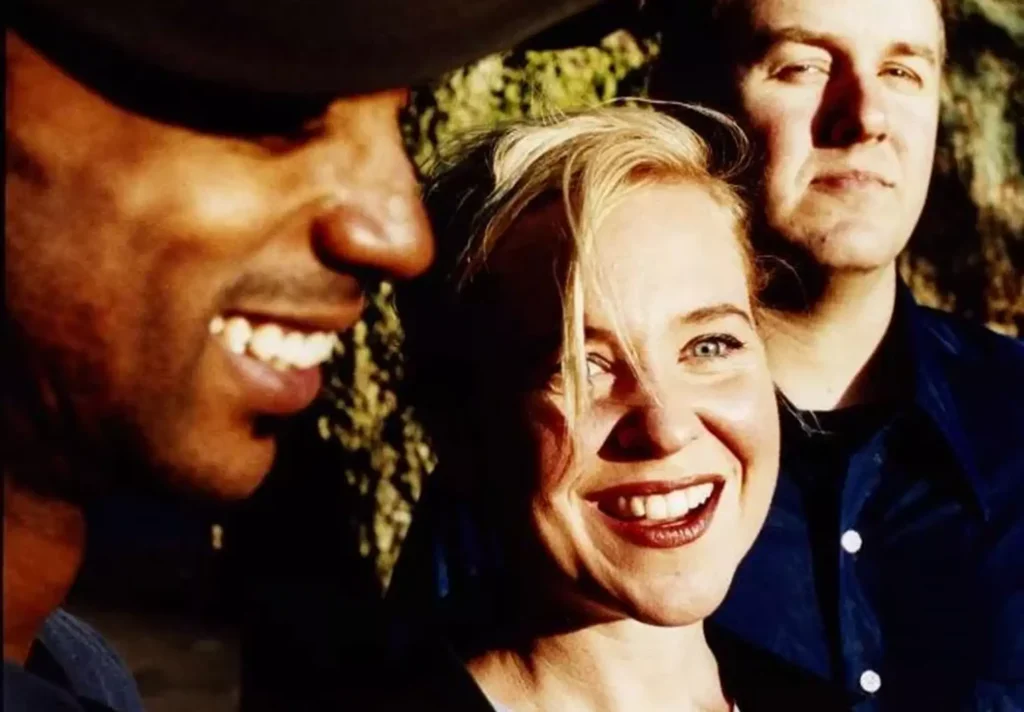
She’s absorbed in thought as she explains her process, “when I first met the songs I thought I’d grabbed the wrong guitar. They seemed slow and the vocal was so soft and in the studio I couldn’t get it soft enough so they had to sit through weeks of me going ‘the vocals aren’t right’”. She squeals this comically before lowering her tone. “Then the vocals got quieter and quieter and quieter and I thought this isn’t 50 Foot Wave until I realised that it wanted to sound like somebody waking up on somebody’s floor and that’s quiet, but it’s not weak. It’s kind of wrecked but it’s cool with wrecked!” She cackles, those blue eyes wide and menacing. “When I realise the vocal character then that’s when I realise that the production character should be baritone and real heavy like if you have to wake up on somebody’s floor and gravity’s working on you.”
She’s not wrong, the sound really does invoke that half-lit, dazed, groggy re-entry into consciousness as subtle layers of distortion fuse with her melancholic and woozy vocals, interspersed with waves of unhinged, brooding discord. My advice? Don’t get up, just lie there, submerged in the moment. Well that’s unless you’ve cricked your neck or are bursting for the loo after a night on the tiles.
With not an ego in sight, Hersh and Abong feed off each other, metaphorically of course, with the salami slices sealed safely in the packet. But you can feel their warmth for each other, a certain serenity. They just work and it appears that having Abong by her side gives Hersh a sense of ease. At the same time, Hersh’s support and encouragement seems to fortify Abong’s confidence as he builds his own solo career and it’s pretty clear they’re both besotted.
“We wrote the songs to our new records (Black Pearl and Abong’s Yellowthroat) together at opposite ends of our apartment in New Orleans. Our goal is to have two barns,” laughs Hersh, “not that we don’t get along but we don’t like to be overheard.” As she tries to demonstrate the shotgun layout of their apartment, she tips over her bottle of water. Fred shakes his head, “see, if we had two barns that would just have fallen in the mid-space.”
Although they’ve never written any songs together, Abong is part of Hersh’s Electric Trio which “just feels natural.” I query if 50 Foot Wave’s bassist Bernard Georges has a fear of flying as we never seem to see him over here but apparently it’s just due to other commitments, Hersh explaining that “this is the touring entity because Fred was in The Muses and Rob’s in 50 Foot Wave…and I’m in…me!”
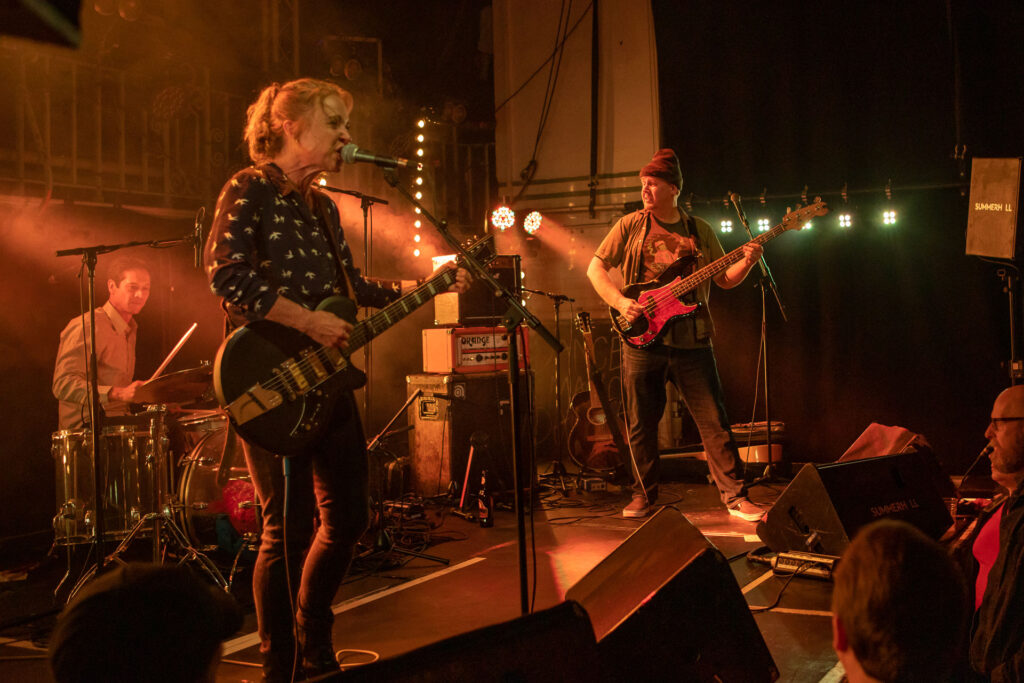
RURAL TOURING CIRCUITS
Hersh was brought up with the hippy ethos and latest book, Seeing Sideways, details her life on the road with her four sons. So do these nomadic roots ever sparks a desire to play more rural venues such as touring the Scottish Highlands rather than slogging it city to city?
“Oh yes, every day. Scotland is like, well I call it home and all my Scottish friends are like ‘When are you coming home?’” She explains that that sort of tour worked for 50 Foot Wave because they were part of the “noise rock circuit” but the Muses and her solo work doesn’t fall under any circuit as such. “Sonic technique really is all it is, it’s like a vocabulary. We were allowed in but even solo acoustic I’m not allowed in to the folk circuit. They have to be able to call you something or they don’t let you in.”
Well it all seems a bit short sighted and the folk circuit is surely missing out, but all is not lost as she seems open to the idea of an acoustic and book tour with Abong. “Yeah, I think if we tour solo, Fred can do readings too, and because there’s no overhead and just two guitars, it could work.”
BOOKS
I really hope this comes to fruition and I’d love to hear her read in that dreamy drawl from her selection of books, including Seeing Sideways which I read under the clutches of covid earlier in the year. As the words floated around in a delightful delirium, I fell into a Hersh-inspired fever dream. Abong’s already in there with a new strapline to promote the book, “Seeing Sideways: Best Covid Reading Ever”. Hersh chips in with a sub-head of “this will make you sick”. Glad to have been of service, guys, and watch those sales dwindle!
She says the book confused the publisher who asked for it, laughing “I mean it wasn’t my idea to write any of my books. Paradoxically Undressing could’ve been a more impressive, more clever book but that would’ve made it dishonest and same with Seeing Sideways. I could’ve tightened it up, I could’ve added clever stuff but I just really, really hate clever.”
It’s true that her writing is highly lyrical and at times reads like a stream of consciousness, but anyone familiar with her lyrics will be pretty attuned to her voice and there’s certainly no question of ghost writing here! It’s packed with honestly and wit, and as she decided against naming any ‘characters’ other than her kids, why not read a passage and try to figure out who the heck she’s talking about with “the drummer”, “the bass player” and “the man”. Maybe she could box it up as a Guess Who stocking filler for the Generation X indie brigade next Christmas.
“This book goes back 30 years and is even more of a fever dream, as you say, than the others. The poor peer reviewers, Freddie had to talk me through it,” she squawks, almost hysterical, “The poor people, like they have no idea what is happening to them (when they’re reading her book) and why do they care? They’re like what time is it? Where am I? What city is it? What are their names? It’s a book, just deal with it, you’re going to be ok!”
That said, she’s just read it again and admits “I get what they’re saying, it is fever dreamy but I’m reading Faulkner at the same time and it’s no where near…look, let’s face it, it’s not Joyce’s Finnegan’s f***ing Wake. I mean you do at least kinda know what’s going on in my book!” She’s right, and if all that deciphering the dream was good enough for the greats of literature, who are we to argue? Hersh may also be interested to know that on publication in 1939, Finnegan’s Wake was reviewed in the Irish Times and carried the following headline: ‘Sixteen Years Work by James Joyce – New Novel is “Endlessly Exciting in its Impenetrability’”.
IMAGE OBSESSIONS
Over the years Hersh has made it clear that there’s a distinct difference between the listener and fan/fanatic, and the musician and performer. Does she find that people still have an image in their head of what she’s like or should be like?
“Oh yeah, and that’s what I keep telling Fred because although he’s been in the business, he’s also just started. He knows what he wants to do and he’s just not about image. Well good luck with that, I say, because you’ve got to be careful and guess what, they’re going to do it and what they did to me was just crazy. That’s all I got. Crazy.”
So can a musician who’s been told by the big guns that they’ll be a star if they just change their look and sound to a certain degree ever really keep any integrity?
“It would be an anomaly, and they do exist but I don’t think they are geniuses. I think there are genius moments, but they are not necessarily even musicians, so these musical moments are corporatised and sold, for sure. Think about Prince, but then he wasn’t always playing music. I think egotistical reward like fame and attention and money doesn’t share itself with music, and music is just going to walk out of the room and that’s it… you’ll have a whole lot of moments that are taken by that sadness so you won’t have any real brightness for anyone else, you’ll be selling product.”
She goes on to say that when she tried to start over solo after Throwing Muses, she dyed her hair black for the release of her first record, trying to find some anonymity. But her record company said it gave negative connotations like “you’re depressed, you’re angry, you’re ugly whatever…”. She continues, “you just have to ignore it. Stick around long enough – in my case 40 years – and it’s kinda like all these images are thrown up in the air, and whatever lands is what they pick up. I figured that’s healthier than just the one thing. I started with crazy and if that’s still what they’re saying then I’d be sad.” She lightens up a bit. “Look, it’s just the elaboration of the cartoonisation we do to each other.”
IN THE BEGINNING
Ivo Watts-Russell, founder of 4AD, had to come into the conversation somewhere, being responsible for starting the ball rolling by signing Throwing Muses to the label in the UK back in 1986 (after which they were signed to Sire in the US). He used to call Hersh every day after discovering the Muses’ demo tape, even though he insisted he couldn’t sign American bands. So how did she think this might have paned out with today’s tech? Surely the process would have been less romantic but much quicker, and their reach much wider that what you’d get with an old demo tape and landline?
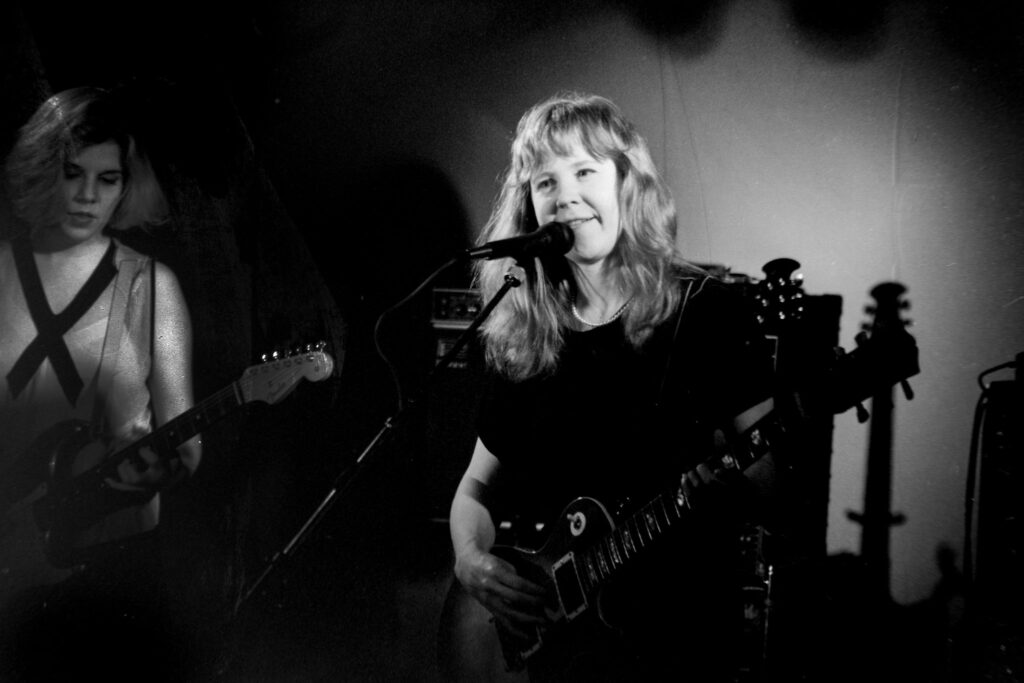
“It’s funny, we were just talking about that this morning. Ivo just wrote and I love that dude, he will always be a bizarre six year old soul to me, he was saddled with the same industry as I was and I always wish I just skipped that and did what Fred’s doing which is knowing what the f*** you’re doing, then begin. But I guess I have the benefit of having been marketed by accident at one point in my life so I can be listener-supported.
Now I can stick to my convictions and say I’m not going to be a f***ing Barbie, I’m not going to play product, I’m not going to flirt.
I don’t know what the answer is but it’s because I was allowed to straddle and the reason was because Ivo called the apartment and just talked about f***ing skin disease.” See, she got back to Ivo in the end, and it was his quirky idiosyncrasies that won her over.
In Paradoxically Undressing, she comically recounts the time Ivo called her to tell her about his boil. “He had so many words for them, he’d say it was brilliant, it burst in a cafe and sprayed all over the wall!” Well, it could’ve been worse, if it had been today he’d be showing her the action over Zoom. Ah the benefits of old school. Unfortunately from here the conversation degenerates as the grotesque goings-on of TV’s Dr Pimple Popper rear their ugly heads. And on that note I turn attention to Abong as Hersh announces “I think I got fired!”
FRED ABONG
Abong has a busy night ahead with a solo set before playing bass with the Electric Trio. A bassist for Throwing Muses and then Belly, the band founded by Hersh’s half-sister and Muses vocalist and guitarist, Tanya Donnelly, Abong’s been carving out a solo career since taking time out from music to complete a PhD, raise a family and dabble in wood work. He released his Homeless EP in 2018 followed the next year by Pulsing and 2020’s Our Mother of Perpetual Help.
As the blasting beats of Ahlers’ drums pulsate though the walls from the Dissection Room, Abong tells us a bit about his new solo album Yellowthroat, to be released in June by Seattle-based distribution label, Disc Drive, and soothing new single, Aurora, released on 1 May, “with the video staring Lady Hersh!”
Hersh dismisses this right away. “I’m not the star, I’m the character actor.”
He describes Yellowthroat as his crooner record. “It’s all done on classical guitar, that’s the classic troubadour instrument as far as I’m concerned, and it’s down-tuned classical which is a very low tuning so the vocal range matches.”
“Before I started writing, me and Kris were having a chat with Rob because we missed him because of covid and I just saw his sweet little face screen and I said Rob, you’ve got to produce my next record!”
Hersh seems energised, talking about Abong’s venture and it’s probably pretty refreshing after 40 year talking about her own. “Aw,” she gushes, “it was the coolest moment dude!”
Abong continues to sing Ahlers’ praises. “He’s just so f***ing talented and has such a great musical ear, so over 2021 we got it together. He plays everything except classical guitar and vocals. I wrote all the songs, the songs had their structure but he brought the additional vaporwave production to it, a lot of strings, keyboard stuff, live drums, synth drums, it’s kind of all over the place, but very romantic.”
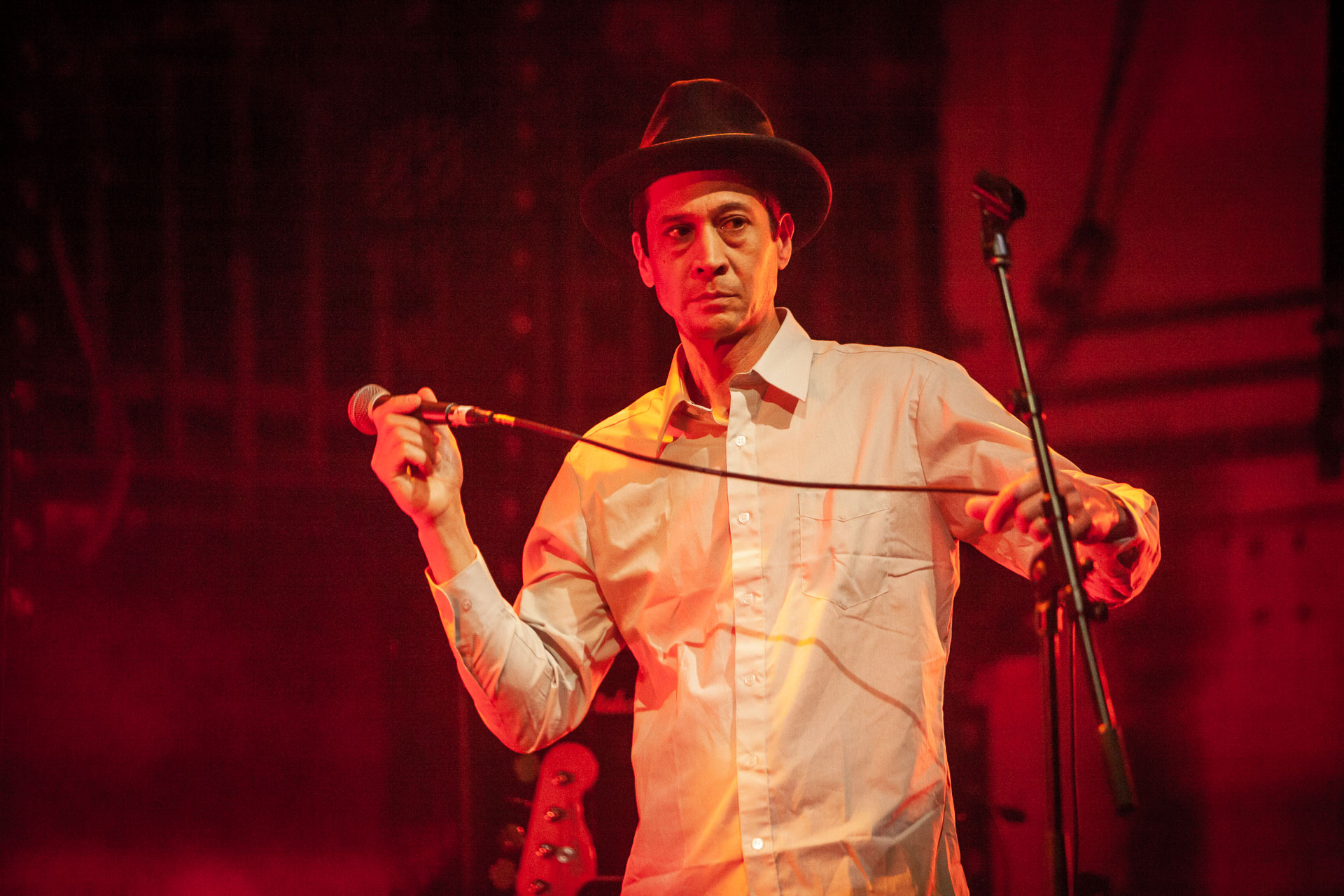
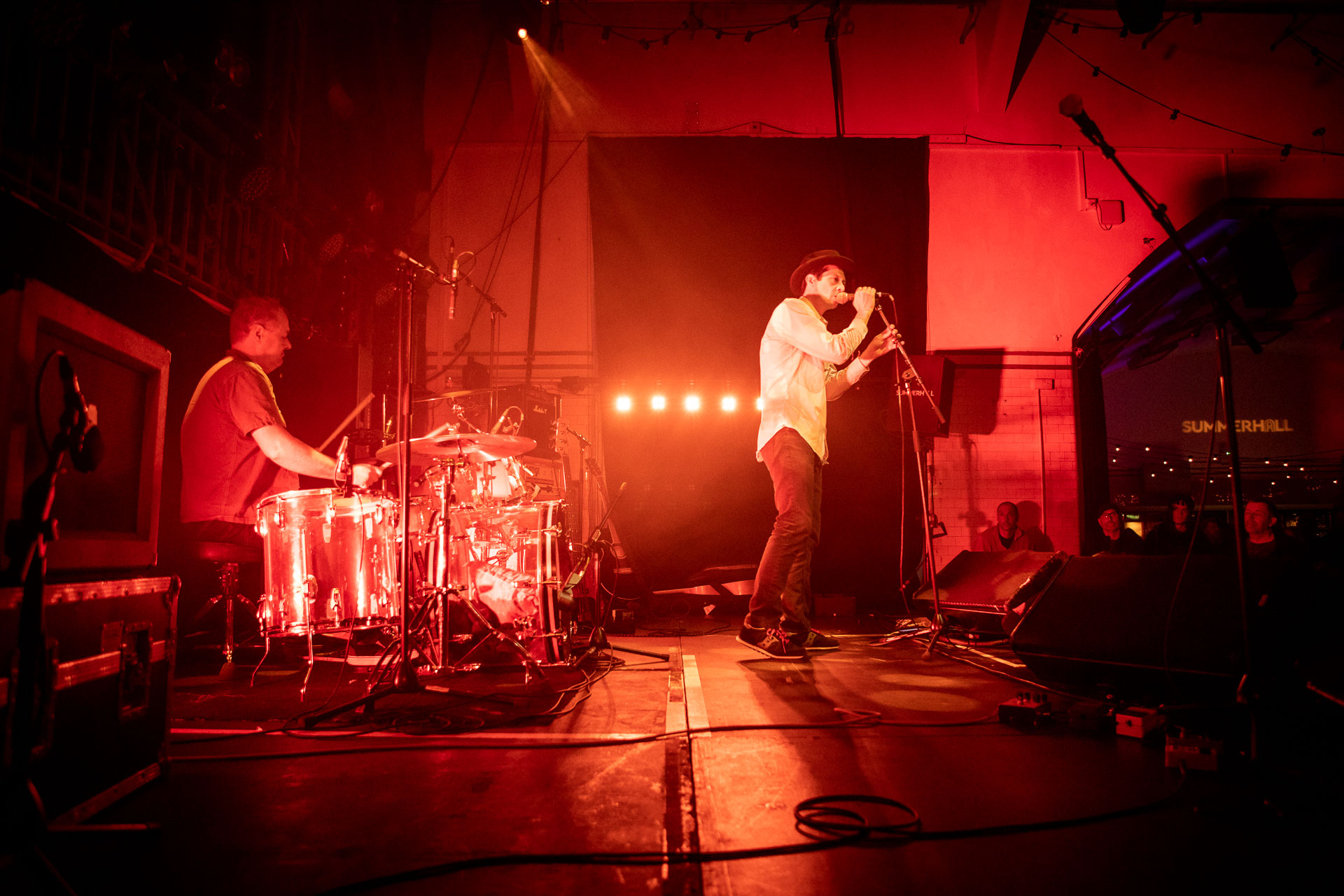
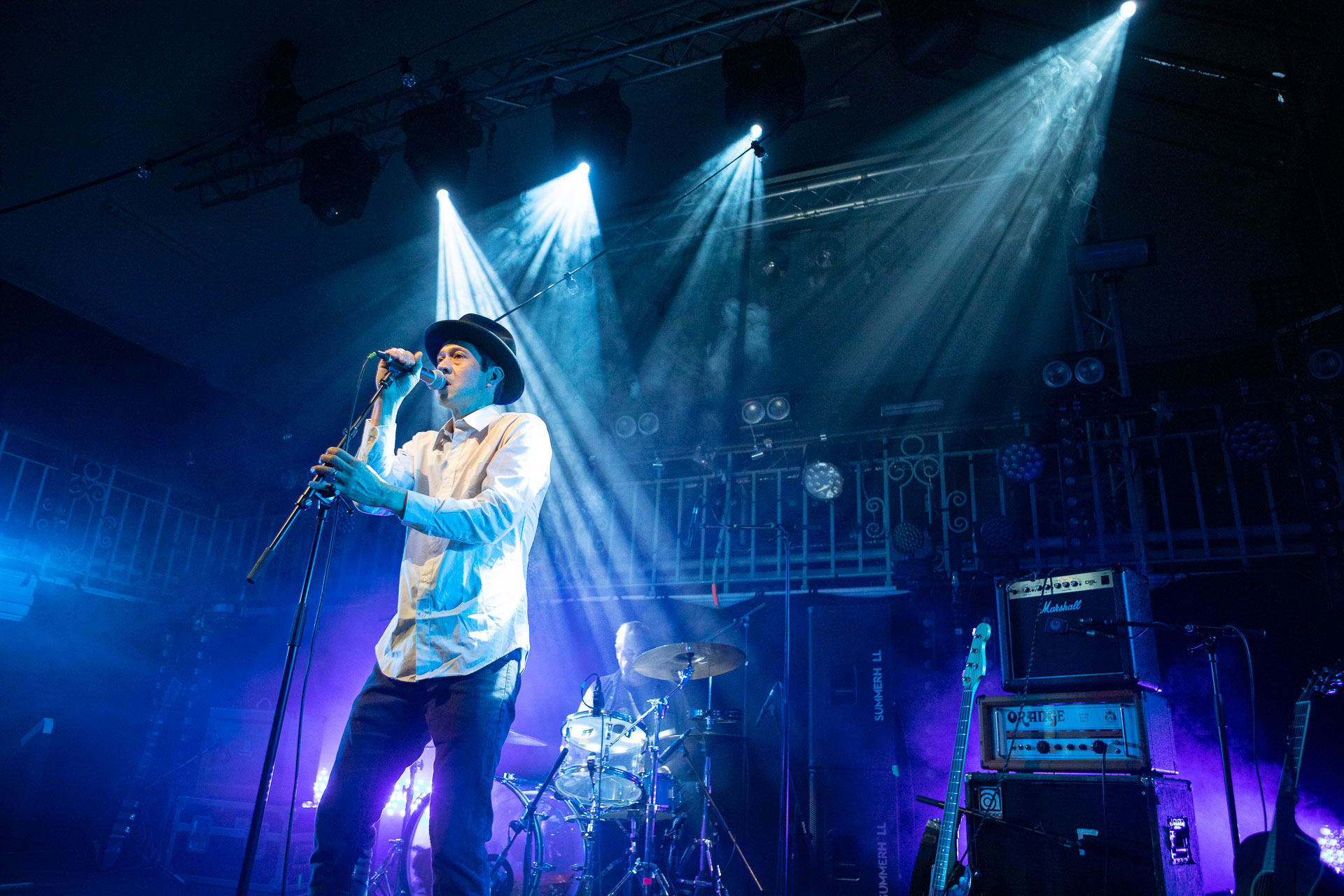
Hersh explains that vaporwave is “like an art movement that is nostalgic about crap, like crappy sounds from the ‘80s. But it is truly lovely, like heartfelt, like childhood photographs from the ‘70s and ‘80s. I was shocked at how well it worked because it’s so raw, and like I said I was playing baritone at one end of the apartment and he was tuned out at the other. New Orleans is heavy with sin and pain and joy and real.” She almost sings these words, her adoration for the place indisputable. “And Fred’s take on it? Well he wasn’t waking up on anyone’s floor, it’s crooning, yes crooning is the right word for it.”
Sadly he has no tux, but he does have a new fedora hat which he picked up in Glasgow the previous day and is very excited to show off. Yep, it was made for his thick thatch of dark hair, and because he’s not waking up on anyone’s floor he needn’t worry about creasing that brim.
Before he starts his soundcheck there’s one more question. As former bassist of Belly, did he create the riff to White Belly, my favourite track but one they failed to play live in their last two trips to Glasgow?
“Yeah I wrote the riff for that. I wasn’t writing songs back then, it was still early for me, I didn’t start writing my own songs until I was in my mid-30s.”
Anyway he decides to take all the credit for the number “I’m the good part!” He then recalls having a restraining order put on it so they weren’t allowed to play it at the Glasgow gigs I mentioned. Gotta love Fred, and of course White Belly is in fact free to wander the streets, and has come to no harm in the making of this interview.
As Abong ambles off to do his sound check, I ask Hersh if she’s been to any gigs lately. She looks incredulous, like I just asked her if she voted for Trump in the last election. “If I love music or a musician I’ll play with them I suppose.”
THAT OLD SEXISM THING
So is she enjoying getting out on the road again after the long hiatus, and does is feel any different this time around?
“I’m really shy so I probably wouldn’t do this if I didn’t have to, but it’s the only honest way to make money.” With that in mind, she reflects on how different things would’ve been if she’d “worked the bimbo thing” like her record companies had desired, saying “it was very damaging to women to send that message and there’s no music in that equation, so I said what am I doing here and they took Throwing Muses’ record off the radio. They wouldn’t send our record to record stores. So literally I was starving, had a new baby and wasn’t allowed to work unless essentially f***ed the moguls.”
There’s a feral rage in her eyes, and I can imagine her wailing the angry lyrics of 50 Foot Wave’s Pneumo to the said moguls. The whole sexism issue in the music industry just won’t sling its hook and every cadence of her voice expels her disgust at the way women are still being treated.
“I’m still recovering from 30 years ago when they said women aren’t allowed to play music, women are allowed to be whores and that’s it and there are millions of women willing to do that.”
She’s not having a go at these women, rather she realises how desperate people are to succeed and how vulnerable it makes them in the process, so open to the hypocrisies and extortion expelled by certain corporations. She continue, wearily, “I just don’t know how to help them except to send some kind of message that says you are responsible for your own humanity and you will still survive. You will be loved and you will work. But right now we have not created that playing field.”
She’s introspective for a moment. “We’re still trying to create some kind of soundtrack where women get to have humanity and bodies, to be mothers, you know, something that isn’t child pornography.”
It feels like one step forward, two steps back at the moment, but with the support of spokespeople like Hersh, we must continue to make a stance and keep fighting the prejudices which litter so many aspects of our lives, and not just the music industry.
She’s just getting going, her chin resting on her hand as she speaks of her worries for her sons’ futures, and those with young daughters, so besieged by image.
As she heads through for her sound check, we feel like we’ve been hit by the 50 foot wave of a woman so singular and impassioned that although she hates a label, she really could be an icon for today’s young people. Keep on fighting Kris, we need the like of you more than ever!
Words and interview: Shirley Mack @musingsbymarie
Pictures: Calum Mackintosh
50 Foot Wave’s Black Pearl is out now on Fire Records.
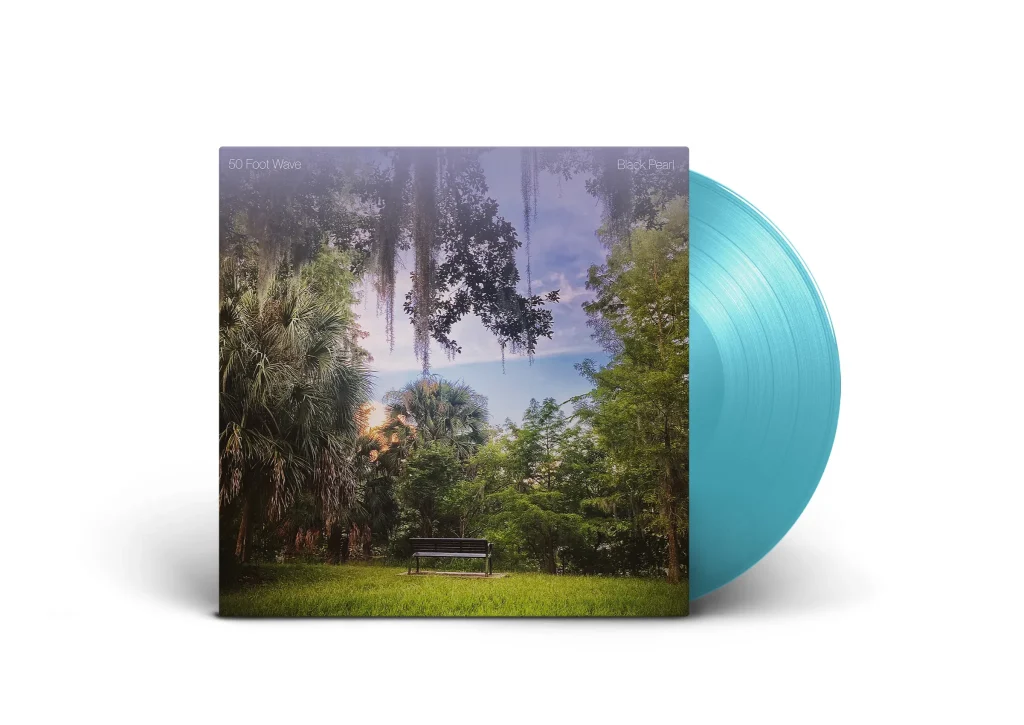
Fred Abong’s Aurora is available now and Yellowthroat is out in June.
Visit Fred’s Bandcamp page here




